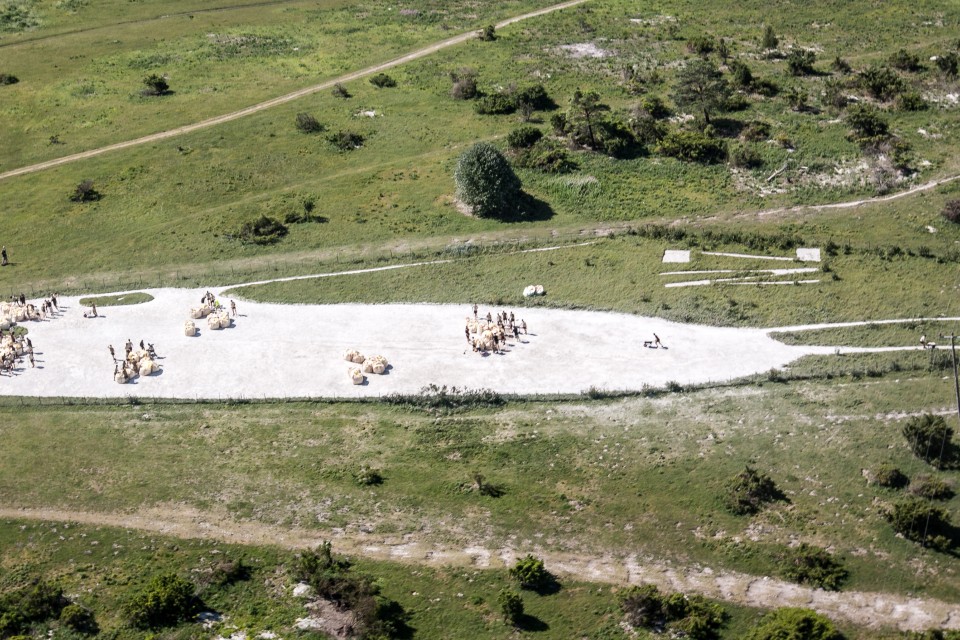One hundred tons of chalk have been ferried to a hillside near Bulford where it was spread over the Kiwi figure to restore it to its former splendour.
The 130m-tall chalk bird, affectionately termed the 'Bulford Kiwi', was carved into Beacon Hill on Salisbury Plain in 1919 by New Zealand soldiers stationed there and waiting to return home at the end of the First World War. The Kiwi soldiers played a key role in the Battle of Messines which took place in Belgium in 1917. The soldiers carved the Kiwi into the chalk to commemorate their achievements during the battle.
As custodians of the monument, 249 Gurkha Signal Squadron organised a one-day event, in conjunction with Defence Infrastructure Organisation (DIO) to de-weed, re-edge and re-chalk the Kiwi and restore it to its original shape. The work party was entertained by a traditional khukuri dance before the restoration works began.
The Bulford Kiwi is a scheduled monument, which means it is recognised as a nationally important archaeological site and it is now protected from destruction or change.
Part of DIO's role is to look after the MOD estate and there is a lot of work carried out each year to preserve and protect monuments and sites of historical and scientific interest.

A previous clean-up of the Bulford Kiwi, in 2018. Crown Copyright / MOD 2018.
The Kiwi restoration work took place under the guidance of Richard Osgood, the Defence Infrastructure Organisation's senior archaeologist. He said:
Once the chalk had been 'placed' on the Kiwi a team of volunteers including people from the DIO, 3rd (United Kingdom) Division Signal Regiment, Landmarc Support Services, Operation Nightingale and other local and conservation groups helped to spread it.
It was definitely an 'all hands-on deck' experience! Fortunately, the weather was on our side on the day, so the task of chalk spreading was an enjoyable one.
This is perhaps one of the most unusual First World War monuments on Salisbury Plain and restoring the monument helps us remember those who served over 100 years ago. The Kiwi is a much-loved monument locally, nationally and internationally.
Warrant Officer Cedge Blundell from the New Zealand Defence Force was joined at the refresh exercise by personnel from the New Zealand High Commission and a small representation from Ngati Ranana, the London-based Maori cultural group. Some of the group's family members, who served at Bulford, known then as 'Sling Camp', embarked from the camp to the Western Front on 30 Oct 1916. He said:
Having something tangible here in the UK which provides such a well-known and visible connection between all New Zealanders (Kiwis) and our history and in particular the soldiers who fought in WW1 is significant.
To have the opportunity to work alongside 249 Gurkha Signal Squadron, who are tasked with the refresh exercise of this site is an honour and privilege for those of us able to attend this year, especially as it's the first time in a few years due the restrictions which have been in place over recent times.
Landmarc's rural team supported the restoration by providing 10 tonnes of chalk, which had been recycled from a previous project. The chalk was originally meant to be delivered by a Chinook helicopter, which was unable to make the drop at the last minute, so the team stepped up and delivered it by tractor. Team members also joined the volunteers to offload the chalk and help with scrub clearance.
Ex KIWI REFRESH is part of an ongoing restoration project to preserve the Kiwi depiction. There will be a subsequent wreath laying on 22 June 2022. The last restoration took place in June 2018.






